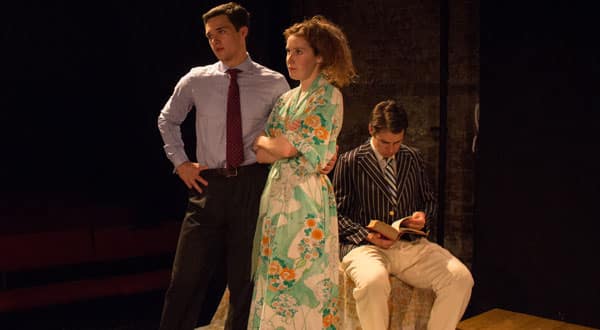
The Man Who Had All The Luck
Kings’ Head Theatre
3/09/15
5 Stars
The Man who had all the Luck is not quite Arthur Miller’s first play, but certainly his first produced professionally. Written in 1941 and staged unsuccessfully three years later, it disappeared for many decades, with Miller himself regarding it as a failure beyond salvage. In this country it was revived at the Bristol Old Vic in 1990, and then again more recently at the Donmar in 2008.
The piece very much goes against the trend of Miller’s plays as we think we know them. From All my Sons onwards we regard Miller’s work as essentially an exploration of tragic themes in which large social and national questions are dramatised within the matrix of a family drama. Here we get the same intra-familial conflicts and the backdrop of larger political and indeed metaphysical debates, but the overall dynamic is one of remorseless success, not disaster, for the leading character.
Indeed that is the heart of the matter. This is a study of the anguish and self-doubt that comes with sustained good fortune which the character himself believes is wholly undeserved. David Beeves (Jamie Chandler) starts life as a humble garage mechanic with few skills or apparent talents and everything falls into place for him – in work, in love and in friendships. He is successful but not at the expense of other people. This is not enough, because there is still no clear identity and meaning for him in life: to quote Miller himself, ‘he accumulates treasures that rust from which his spirit has fled.’ Moreover those around him, notably his brother Amos (Michael Kinsey), embrace immiserating failure as complete and apparently random as his success.

Surely there has to be a principle of justice running somewhere through life? Or is everything just random, just like the movements of a jelly fish on the tide- ‘The tide goes in and the tide goes out. About what happens to him man has very little to say.’ Surely it is not enough to say that people fail or succeed through good or bad luck, through one mistake? Without the governing (and reassuring) framework of Greek gods or the Christian God where is meaning to be found?
Miller’s dramatic answers to this perennial question are not as searching or searing as in later plays but they anticipate much of the same ground. A capacity for taking pains, modesty and an unending search for integrity of behaviour in respect to others are certainly validated, but not in a naïve fashion. Familiar themes appear as vehicles for the characters’ debates – is the American dream a fraud or for real in the Depression era of the play’s setting? Are aspiration and individual achievement all they appear to be or not? Are there different rules for private and public life? Can fathers and sons and brothers collaborate or are they bound to be in dispute and conflict?
Alongside David himself there are very well developed roles for his sweetheart and then supportive wife, Hester (Chloe Walshe), his father Pat (Keith Hill) and brother, and a gallery of local small-town Midwesterners. The most important of these is Gus (Alex Warner), a skilled Austrian immigrant mechanic, who is one of the few who can really connect with and get through to David’s inner anguish. In the second half the substance of the argument is largely carried on between the two of them.

The play is a very good one, and certainly an important part of the Miller canon; but it is not a masterpiece. Alongside the exceptional trademark qualities it has to be said that there is also some clumsiness in the dramaturgy. Some passages are startlingly underwritten and glossed over too quickly – for example the sudden death of the monstrous patriarch who is the main long-term obstacle to David and Hester’s union. Having set up this tension why dismiss it so abruptly? Likewise it seems a missed opportunity that we see so little of brother Amos in the second half, once the didactic point of his professional failure as a baseball pitcher has been made.
Perhaps the fundamental issue is that the play never quite comes into fully sharp focus and makes forays in the direction of different genres. It threatens to head in a tragic direction overall, and certainly several of the characters completely come to grief. But by never quite declaring its hand the second half becomes entangled in a few too many melodramatic twists and turns as if Miller himself cannot make up his mind.
Miller records in his autobiography Timebends (1987) that the critic John Anderson gave him some insightful commentary on why the play did not work. He told him that there was a shadow world of tragedy lurking within the play: ‘You’ve written a tragedy, you know, but in a folk comedy style’. This was clearly an important lesson for Miller, for however hard it is to generalise across the many plays he later wrote, there is never any uncertainty again about the genre of the work he is embarked on.

There was a lot to admire in the production. The very spare staging worked well as a way of forcing us to focus and reflect on the text and the dilemmas of the characters above all. I did not understand why the final page of the play was revealed inscribed like the Tablets of the Law on the main stage floor in the second half, but otherwise this was a pleasingly straightforward, unfussy production. There was also minimal time-wasting over scene changes, something that I have noted as a problem in previous productions here.
There were no obvious weaknesses in the casting, barring a few insecurities inevitably this early in the run. The accents were mostly secure and everyone navigated the very small thrust stage with confidence and a natural flow of movement – all credit to director Paul Lichtenstern. The principal roles were played by young actors whose urgency, intensity of tone and commitment to the play are absolutely what you need to bring the best out of Miller’s high-minded and ambitious dialogue. This fine ensemble acting bodes well indeed for future productions by the award-winning company End of Moving Walkway.
Arthur Miller was born a hundred years ago. A centenary is about discovering work afresh if it is about anything and the King’s Head deserve great credit for choosing to commemorate this great writer, not through one of plays with which we are very familiar, but with a less-well known but not lesser work that still speaks to us powerfully.
The Man Who Had All The Luck runs at the King’s Head until 27 September 2015
